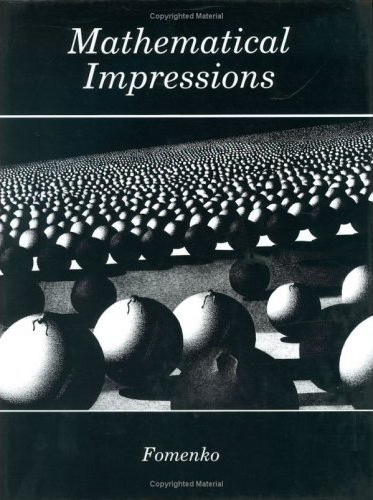A.T.FOMENKO
MATHEMATICAL IMAGES IN THE REAL AND UNREAL WORLD
ABOUT THE AUTHOR
Prof.
A.T.FOMENKO (born 1945), is a Full Member of the Russian
Academy of Sci., Dr. of Sci. (Math. and Phys.), Moscow State
University (Moscow), and Head of the Department
of Differential
Geometry and Applications in Moscow University.
He
is a distinguished mathematician and a well-known specialist
in the fields of geometry, Hamiltonian mechanics, the calculus of
variations, computer geometry, and algorithmical
problems in pattern
recognition. He was a winner of the Award of the
Moscow Math.Soc.
(1974), the Award of the Presidium
of USSR Acad.
in mathematics (1987), and of the State Award of Russia
(in mathemativs) (1994).
He
has obtained fundamental results in the theory of minimal
surfaces and solved the multidimensional
Plateau problem -
the existence of a globally minimal surface in each spectral
bordism
integrable
Hamiltonian systems . This
important problem of
classification of
integrable dynamical systems
(which arise
celestial mechanics and in the theory of
Fomenko obtained the complete classification theory forthe
bifurcation of solutions in integrable Hamiltinian
He also developed a new empirico-statistical
method for
the analysis of narrative texts (e.g. chronicles).
Among the well-known
books written by A.T.Fomenko are:
"Variational Principles in Topology (Multidimensional Minimal
Surface
Theory)",
"Variational Problems in Topology (The Geometry of Length, Area
and Volume)",
and
V.L.Gutenmacher),
Applications",
Topology"
(together
(together with S.P.Novikov and
B.A.Dubrovin),
Homotopic Topology" (together with D.B.Fuchs),
Surfaces and Plateau's Problem" (together with Dao
C.T.),
"Methods of Statistical Analysis for Narrative Texts and
Applications
to Chronology".
These books were
translated into English by Springer-Verlag,
Plenum, Reidel (Kluwer), Gordon and Breach, American Math.Soc.
The following books
were published originally in English:
"Plateau's Problem (vol.1 - Historical Survey, vol.2 - The Present
State of the
Theory" (Gordon and Breach),
"Integrability and Nonintegrability in Geometry and Mechanics"
(Kluwer Acad.Publ.),
"Integrable Systems on Lie Algebras and Symmetric Spaces"
(together
with V.V.Trofimov) (Gordon and Breach).
A.T.Fomenko has also
the talent for expressing abstract mathe-
matical concepts through artwork. Since the mid-1970s, Fomenko has
created more than 280 graphic works. Not only have his images
filled pages of some of his own books in geometry, but they have
also been chosen to illustrate books (of many mathematicians) on
other subjects, such as statistics, probability, number theory and
so on. In addition, his works have found their way into the
scientific and popular press and have been displayed in more than
100 exhibits in the Russia, USA, Canada, the Netherland, India and
much
of Eastern Europe.
In
1990 the American Math.Soc. published the book by Fomenko:
"Mathematical Impressions" containing 84 reproductions of
works by
Fomenko.

"What's
interesting about his work to me is that it shows the
impact of certain mathematical ideas", says William Thurston,
Profes-
sor of mathematics at Princeton University. "It excites your imagi-
nation. It's interesting to look at and think about. It's not designed
to be just a straightforward communication of a simple idea, but to
stir up your imagination - which it does. And in that sense it is
very good and successful. I think it's a very effective way of commu-
nicating mathematics." (Insight Magazine, April 30, 1990).
Springer-Verlag published
the English translation of the book:
A.T.Fomenko "Visual Geometry and Topology". This mathematical
book
also contains 50 reproductions of graphic works of Fomenko.
The book
("Mathematical Images in the Real and Unreal World")
is quite different from the books listed above and contains the total
collection of Fomenko's works with 1/2-mathematical and 1/2
philosophical comments. The works are organized in chapters correspon-
ding to different branches of mathematics, history and philosophy.
The book is unique event in mathematical literature and does not have
analogues.
The epilogue to this
book is written by famous mathematician
Yu.I.Manin.
The book is published in Russia, Moscow (in Russian),
Moscow University Press, 1998.
The book contains
208 reproductions of works by Fomenko (172 in
black and white and 36 in color). In the accompanying captions,
Fomenko explains the mathematical motivations behind the illustrations
as well as the emotional, historical, or mythical subtexts they evoke.
The illustrations carry the viewer through a mathematical world
consisting not of equations and dry logic, but of intuition and
inspiration. Stimulating to the imagination and to the eye, these
works can be interpreted and appreciated in various ways - methema-
tical, aesthetic, or emotional. The commentary to each graphic work
consists of two parts: 1) mathematical explanation, 2) non-mathe-
matical associations connected with the theme of the drawing (his-
torical, mythological et cetera). This second part of comments is
unique in mathematical literature and at first appears in the present
book. Each commentary has the volume approximately 1 page (type-written
manuscript). The book is oriented on the wide audience and is intented
for students, mathematicians, physists and all readers who is interested
in visualization of modern mathematical ideas and their connection
with general human concepts.
The volume of the
book: 210 pages (manuscript), 172 graphic
works (black-white, half-tone, the size: 30 x 40 cm, 36 color works;
each print needs in 1 individual page. Thus, the total volume is as
follows: 210 + 208 = 418 pages.
C o n t e n t.
Introduction. Associative-visual thinking in modern mathematics.
1. Images in general and algebraic topology. Simplicial and cell
complexes.
2. Images in geometry and topology of smooth manifolds.
3. Images in mathematical analysis. Functions on the manifolds,
algebraic surfaces
and singular points.
4. Images in mathematical physics, mechanics, differential equations.
5. Images in the calculus of variations, differential equations,
group theory and
crystallography.
6. Images in computer geometry. Algorithmical problems of recogni-
zability.
Mathematical statistics and probability theory.
7. Geometrical images in the novel of M.A.Bulgakov "Master and
Margaret".
8. Images in the general mathematical concepts.
9. Images in color.
10. APPENXIX
Yu.I.MANIN.
About graphic
works of Fomenko.